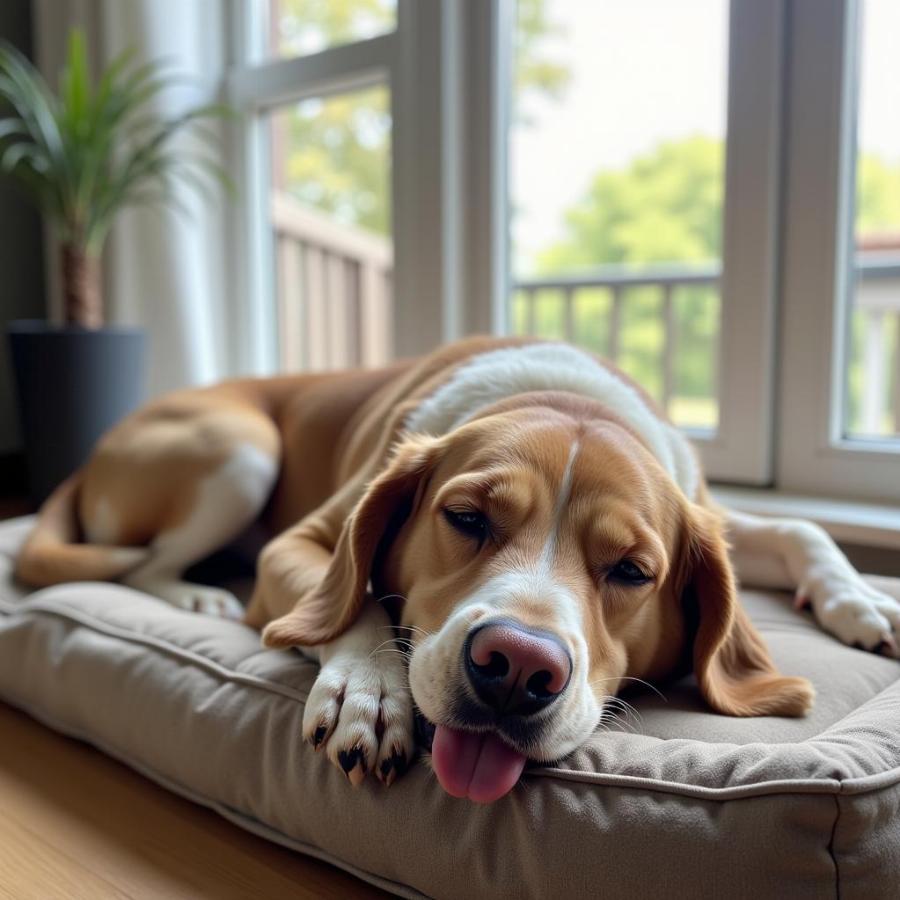As our furry friends age, they may develop certain quirks and habits that are perfectly natural for their golden years. One such behavior is panting. While all dogs pant to regulate their body temperature, old dog panting can sometimes signal an underlying health issue. So how can you tell the difference between normal panting and a sign that your senior dog needs to see the vet?
This comprehensive guide delves into the reasons behind old dog panting, helping you discern when it’s simply a part of aging and when it warrants a trip to the veterinarian. We’ll explore the common causes, symptoms to watch out for, and provide tips on how to keep your senior dog comfortable and healthy.
Why Does My Old Dog Pant So Much?
Panting is a normal physiological response in dogs that helps them cool down. However, increased panting in older dogs can be triggered by a variety of factors, ranging from benign to serious. Here are some of the most common reasons why your old dog might be panting more than usual:
1. Pain or Discomfort
Just like humans, dogs can experience aches and pains as they age. Arthritis, hip dysplasia, and other age-related conditions can cause chronic discomfort, leading to increased panting.
2. Cognitive Decline
Cognitive decline, similar to dementia in humans, can affect senior dogs. This can manifest as confusion, anxiety, and restlessness, all of which can contribute to panting.
3. Heart Disease
Heart disease becomes more prevalent in older dogs. As the heart weakens, it has to work harder to pump blood effectively, leading to increased panting, especially after exercise or exertion.
4. Cushing’s Disease
Cushing’s disease, a hormonal disorder that causes an overproduction of cortisol, is more common in senior dogs. Panting is a common symptom of Cushing’s disease, along with increased thirst and urination.
5. Respiratory Issues
Respiratory problems, such as pneumonia, bronchitis, or tumors in the lungs, can make it difficult for dogs to breathe properly, resulting in increased panting.
When is Panting a Cause for Concern?
While some panting is normal, it’s essential to recognize when your old dog’s panting could indicate a serious problem. Contact your veterinarian immediately if you notice any of the following:
- Excessive Panting: Panting that is out of proportion to the dog’s activity level or the temperature.
- Labored Breathing: Struggling to breathe, with exaggerated chest movements or gasping for air.
- Blue or Pale Gums: A sign of inadequate oxygen supply, requiring immediate veterinary attention.
- Collapse or Lethargy: Extreme weakness or collapsing can indicate a life-threatening condition.
- Panting Accompanied by Other Symptoms: Such as coughing, wheezing, vomiting, diarrhea, or loss of appetite.
Tips for Helping Your Old Dog Breathe Easier
Here are some things you can do to help alleviate your old dog’s panting and keep them comfortable:
- Provide a Cool and Comfortable Environment: Ensure your senior dog has access to shade, fresh water, and a cool place to rest, especially during warmer months.
- Manage Weight: Obesity can worsen breathing difficulties, so maintaining a healthy weight is crucial for your senior dog’s respiratory health.
- Regular Veterinary Checkups: Regular checkups allow your vet to monitor your dog’s overall health and detect any potential problems early on.
- Medications: Your veterinarian may prescribe medications to manage underlying conditions that contribute to panting, such as pain relievers for arthritis or medication for heart disease.
FAQs About Old Dog Panting
Q: Is it normal for my old dog to pant while resting?
A: Some panting while resting is normal, especially in hot weather. However, if your dog is panting excessively or seems distressed, it’s best to consult your vet.
Q: Why is my old dog panting and shaking?
A: Panting and shaking can be symptoms of pain, anxiety, or even poisoning. It’s crucial to contact your veterinarian immediately if you notice these signs.
Q: Can hot weather make old dog panting worse?
A: Yes, older dogs are more susceptible to heatstroke and can overheat easily. It’s crucial to keep them cool and hydrated in warm weather.
 Senior Dog Resting Comfortably
Senior Dog Resting Comfortably
Conclusion
Panting is a common behavior in dogs, but it can take on a different meaning as they age. By understanding the potential causes of old dog panting and recognizing the warning signs of a serious problem, you can ensure your furry friend receives timely veterinary care and enjoys their golden years to the fullest. Remember, when in doubt, it’s always best to err on the side of caution and consult your veterinarian.
Need More Advice?
For more information on senior dog health and other helpful tips, explore our related articles:
- old dog panting while resting
- laboured breathing in dogs
- why is my dog breathing heavy while sleeping
At Beaut Dogs, we are passionate about providing dog owners with the knowledge and resources they need to provide the best possible care for their canine companions. If you have any further questions or concerns about your old dog’s panting, please don’t hesitate to reach out to us at [email protected].